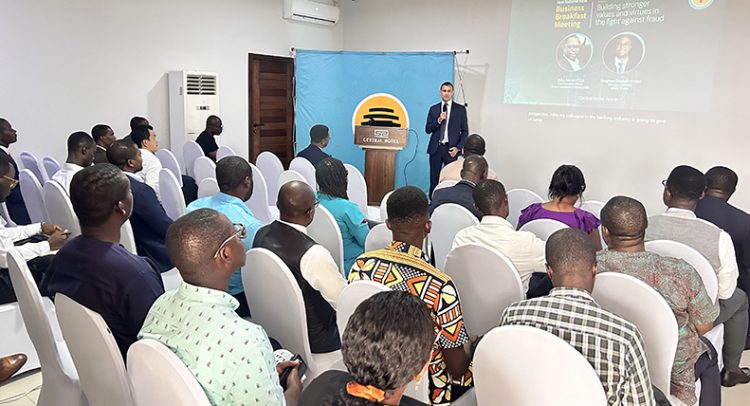Warren Adams
The Chief Executive of First National Bank Ghana, Warren Adams has called for businesses to prioritize the nurturing of stronger internal ethics and principles, in the fight against fraud.
Speaking at First National Bank’s annual Business Breakfast meeting organized as part of activities to mark Fraud Week Mr. Adams highlighted that fraud is a pervasive and insidious threat plaguing individuals, organizations, and societies worldwide.
According to the Bank of Ghana Banks, Specialized Deposit-Taking Institutions (SDIs) and Payment Service Providers (PSPs) 2023 Fraud Report, the count of fraud cases increased to 15,865 in 2023 from 15,164 in 2022, reflecting a 5% rise. These cases corresponded to a total loss value of approximately Gh¢88 million in 2023 as compared to GH¢82 million in 2022, indicating an increase of about 7%.
The report indicated that the fight against fraud in the financial sector is a shared responsibility of all well-meaning stakeholders and continued vigilance is vital as fraudsters continuously deploy new ways of defrauding victims through increased usage of sophisticated technology.
“It is clear that conventional measures alone are insufficient,” Mr. Adams said. “A critical yet often overlooked component in the fight against fraud is the cultivation of stronger values and virtues”.
The event served as a prelude to the commemoration of International Fraud Awareness Week from November 17.
Mr. Adams suggested that this year’s theme, “ethics and fraud,” underscores the vital importance of ethics in safeguarding organisations’ integrity and consumers’ protection.
“Ethics are the foundation upon which trust is built,” he said. “By prioritizing ethics, we foster a culture of transparency, accountability, and fairness, ultimately strengthening our financial systems that support your business.”
The keynote speaker at the breakfast meeting, Mr. John Awuah, Chief Executive Officer of Ghana Association of Banks (GAB), pointed out that apart from measures that institutional stakeholders are putting in place to curb the menace of fraud and minimize its impact on businesses, there is the need for interagency cooperation.
“The closer industry partnerships are forged, the more the opportunities for knowledge sharing and resources can be leveraged to prevent fraud as we strive to build a more just and trustworthy society,” he said.
Mr. Annan also mentioned that beneath the surface-level causes of fraud and unethical behaviour lies a more profound issue: a deficit of character.
“When individuals prioritize personal gain over integrity, honesty, and fairness, the stage is set for fraudulent behavior,” he said, emphasizing that “stronger values and virtues serve as a powerful antidote to fraud.”
He indicated that strategies for building stronger values and virtues require that organizational leaders lead by example, modelling and promoting ethical behaviour.
“Establishing and enforcing robust policies and procedures while conducting regular training on these virtues and values encourages transparency. When necessary, incentivizes ethical behaviour”, he concluded.


